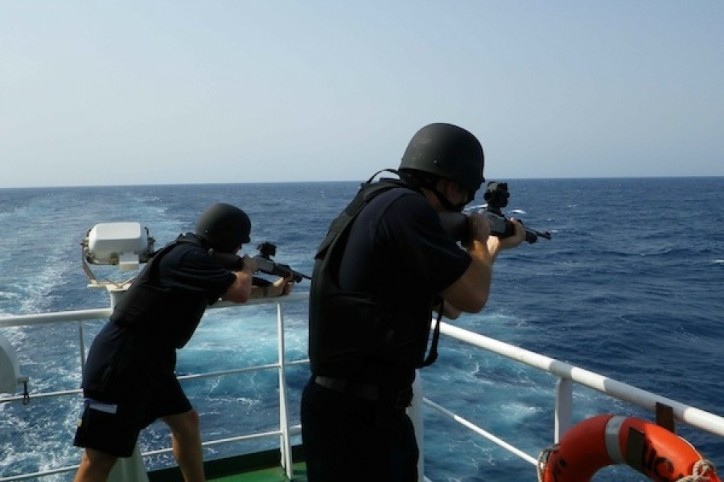Indonesia is looking at the option of posting security guards aboard commercial ships passing through the waters of Sulu in the Philippines, which are infested by militant group Abu Sayyaf.
While enabling security forces to accompany commercial vessels is legally possible, an expert warned that potential clashes resulting from the onboard presence of armed security personnel could aggravate the situation and be seen as an intrusion into the Philippine purview.
Indonesian Foreign Ministry spokesman Arrmanatha Nasir said on Thursday that allowing private security armed forces in Sulu waters was among the options being deliberated by the Indonesian, Philippine and Malaysian governments as a follow up to a tripartite meeting.
He added, however, that legal preparation was needed to realize such a move, as there were currently no supporting regulations.
“We are looking into IMO [International Maritime Organization] regulations and there is a stipulation that allows for the deployment of armed forces.”
If the move is agreed by the three countries, companies will be encouraged to voluntarily employ security forces at their own expense, complementing joint patrols to be carried out by naval forces from the three countries.
Abu Sayyaf has repeatedly abducted sailors in the waters located between the three countries for ransom. Since March 24, Indonesian nationals have been taken hostage by the group in four separate kidnapping incidents, with 10 remaining in captivity.
The three countries’ foreign ministers and army chiefs met in Yogyakarta to discuss the matter, leading to an agreement to formulate a standard operating procedure (SOP) that will include establishing joint naval patrols and setting up a sea lane for ships to safely navigate.
The SOP is currently being finalized, Arrmanatha said, with the use of armed force under deliberation.

Coordinating Political, Legal and Security Affairs Minister Luhut Pandjaitan previously said that sea marshals could be posted on board vessels shipping goods to the Philippines, with the government deliberating the move in accordance with IMO regulations.
The IMO, on its website, says that ships using privately contracted armed security personnel (PCASP) are subject to diverse legal regimes and that there are no agreed minimum performance standards.
Its position on the matter has evolved overtime, it says, from strongly discouraging armed protection to “acknowledging that the deployment of armed security personnel on board ships has become an accepted industry and flag state practice in certain circumstances”.
It reaffirmed in 2011 that it neither endorsed nor condemned the use of armed personnel on board merchant ships and accepted that the issue was subject to the law of individual flag states.
University of Indonesia law and security expert Hikmahanto Juwana said that while it was legally possible to install sea marshals or private armed guards on ships, with the only obstacle possible Philippine objections, the government needed to consider how possible clashes between armed personnel and Abu Sayyaf members might lead the group to become more aggressive toward Indonesian sailors.
“While it may be entirely possible for the Philippines to allow armed personnel to enter, given the rising tensions in its southern territory, we need to bear in mind that the group is formed with political motives and that it is common for them to see their government as the enemy,” he said.
Abu Sayyaf was initially a militant faction of the separatist Moro National Liberation Front (MNLF), before the latter reconciled with the government in the late 1990s.
Source: The Jakarta Post